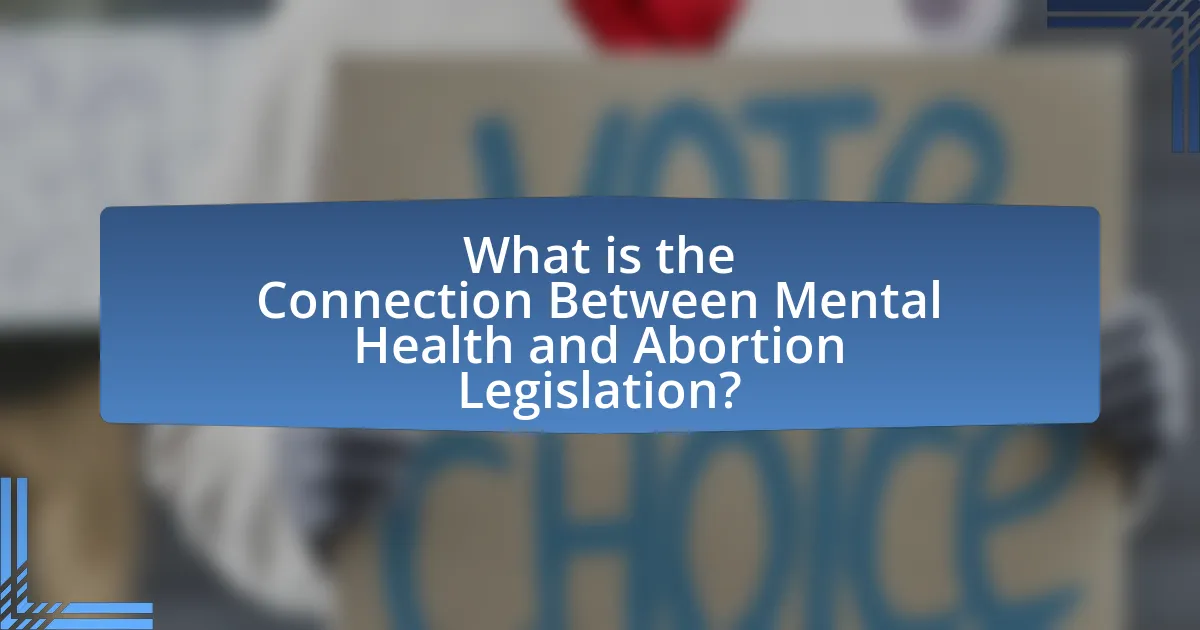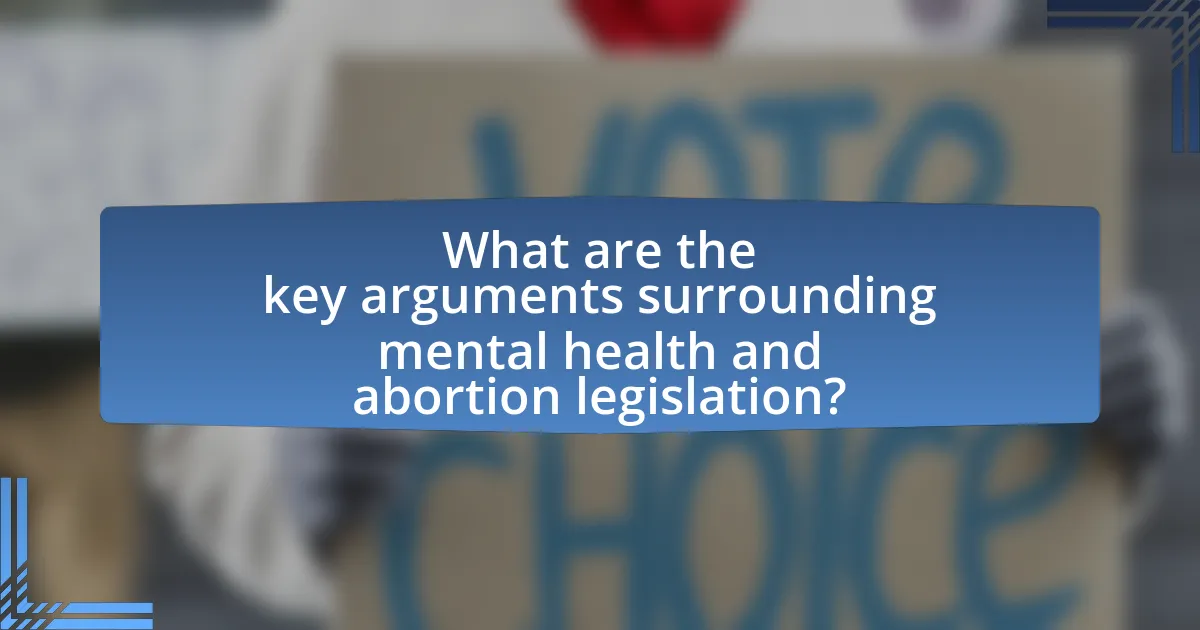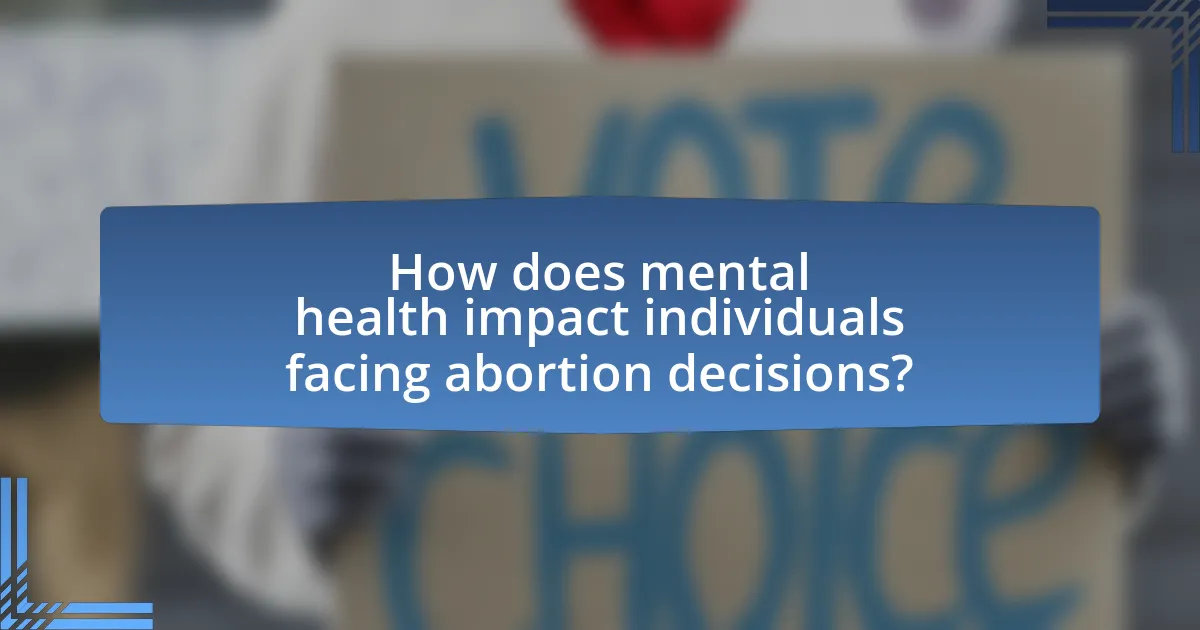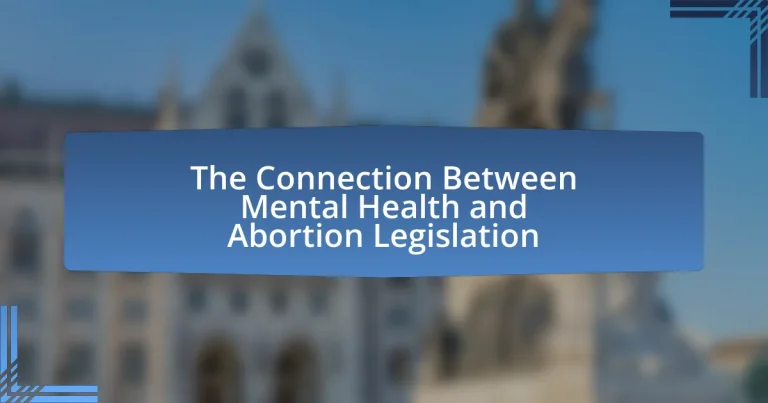The article examines the connection between mental health and abortion legislation, highlighting how restrictive abortion laws can adversely affect individuals’ psychological well-being. Research indicates that those denied abortions are significantly more likely to experience anxiety, depression, and lower life satisfaction compared to those who have access to abortion services. The discussion includes the influence of mental health considerations on legislative frameworks, the specific mental health issues associated with abortion, and the varying approaches different countries take regarding mental health in their abortion laws. Additionally, the article addresses the potential consequences of neglecting mental health in abortion policies and the role of mental health advocacy in shaping legislation.

What is the Connection Between Mental Health and Abortion Legislation?
The connection between mental health and abortion legislation lies in the impact that restrictive abortion laws can have on individuals’ psychological well-being. Research indicates that individuals denied abortions are more likely to experience anxiety, depression, and lower life satisfaction compared to those who are able to access abortion services. A study published in the journal “JAMA Psychiatry” found that women who were denied an abortion were three times more likely to experience mental health issues than those who received the procedure. This evidence underscores the importance of considering mental health outcomes when formulating abortion policies, as access to safe and legal abortion can be crucial for the mental well-being of individuals facing unplanned pregnancies.
How do mental health considerations influence abortion legislation?
Mental health considerations significantly influence abortion legislation by shaping the legal framework that allows for exceptions based on psychological well-being. Many jurisdictions recognize that mental health issues, such as severe anxiety or depression, can arise from unwanted pregnancies, prompting lawmakers to include mental health as a valid reason for seeking an abortion. For instance, studies indicate that women who are denied abortions are more likely to experience mental health problems, reinforcing the argument for mental health considerations in legislative discussions. This connection is evident in various legal cases and policies that prioritize the mental health of individuals when determining access to abortion services.
What specific mental health issues are often discussed in relation to abortion?
Specific mental health issues often discussed in relation to abortion include anxiety, depression, and post-traumatic stress disorder (PTSD). Research indicates that individuals may experience heightened anxiety and depressive symptoms following an abortion, particularly if they face stigma or lack support. A study published in the journal “JAMA Psychiatry” found that women who had abortions reported higher rates of mental health issues compared to those who carried pregnancies to term, emphasizing the importance of mental health support in the context of abortion. Additionally, PTSD can arise in some individuals due to the emotional and psychological impact of the abortion experience, particularly if it was not a fully voluntary decision.
How do different countries approach mental health in their abortion laws?
Different countries approach mental health in their abortion laws with varying degrees of consideration and integration. For instance, in the United Kingdom, mental health is explicitly recognized as a valid reason for seeking an abortion under the Abortion Act of 1967, allowing women to terminate pregnancies if continuing them would pose a risk to their mental health. In contrast, countries like Poland have restrictive laws where mental health considerations are not sufficient grounds for abortion, leading to significant challenges for women facing mental health issues. Additionally, in Canada, there are no legal restrictions on abortion, allowing mental health to be a personal consideration without legal barriers. These differences highlight how cultural, legal, and healthcare frameworks influence the intersection of mental health and abortion legislation across various nations.
Why is the connection between mental health and abortion legislation important?
The connection between mental health and abortion legislation is important because access to safe and legal abortion services can significantly impact the mental well-being of individuals facing unplanned pregnancies. Research indicates that restrictive abortion laws can lead to increased mental health issues, such as anxiety and depression, among those who are denied the procedure. A study published in the American Journal of Psychiatry found that women who were denied abortions were more likely to experience mental health problems compared to those who were able to obtain them. This highlights the necessity of considering mental health outcomes when formulating abortion policies, as legislation that limits access can adversely affect the psychological health of individuals.
What are the potential consequences of ignoring mental health in abortion policies?
Ignoring mental health in abortion policies can lead to increased psychological distress among individuals seeking abortions. Research indicates that women who are denied abortions experience higher levels of anxiety, depression, and lower life satisfaction compared to those who receive the procedure. A study published in the American Journal of Psychiatry found that 95% of women felt relief after an abortion, while those denied the procedure faced significant mental health challenges. Furthermore, neglecting mental health considerations can exacerbate existing mental health conditions, leading to long-term consequences such as increased healthcare costs and a greater burden on mental health services.
How can mental health advocacy shape abortion legislation?
Mental health advocacy can significantly shape abortion legislation by emphasizing the psychological well-being of individuals facing unplanned pregnancies. Advocacy efforts can lead to the inclusion of mental health considerations in legislative discussions, ensuring that laws reflect the importance of mental health in reproductive choices. For instance, research indicates that women who are denied abortions are more likely to experience anxiety and lower life satisfaction, highlighting the mental health implications of restrictive abortion laws. By presenting such evidence, mental health advocates can influence policymakers to create laws that prioritize mental health support and access to safe abortion services, ultimately leading to more comprehensive reproductive health legislation.

What are the key arguments surrounding mental health and abortion legislation?
The key arguments surrounding mental health and abortion legislation focus on the impact of abortion access on women’s mental health and the ethical considerations of mental health as a criterion for abortion. Advocates argue that restricting access to abortion can lead to negative mental health outcomes, including increased anxiety and depression, particularly for women facing unwanted pregnancies. Research published in the journal “JAMA Psychiatry” indicates that women who are denied abortions are more likely to experience mental health issues compared to those who receive the procedure. Conversely, opponents of broad abortion access often raise ethical concerns about the use of mental health as a justification for abortion, arguing that it could lead to potential misuse or trivialization of mental health issues. This debate highlights the complex interplay between reproductive rights and mental health considerations in legislative contexts.
What are the pro-choice perspectives on mental health in abortion legislation?
Pro-choice perspectives on mental health in abortion legislation emphasize the importance of mental well-being as a critical factor in a woman’s decision to terminate a pregnancy. Advocates argue that access to safe and legal abortion services is essential for protecting women’s mental health, as unwanted pregnancies can lead to significant psychological distress, anxiety, and depression. Research indicates that women who are denied abortions are more likely to experience mental health issues compared to those who have access to the procedure, highlighting the necessity of considering mental health in legislative discussions. For instance, a study published in the journal “JAMA Psychiatry” found that women who were denied abortions reported higher levels of anxiety and lower life satisfaction over a five-year period compared to those who received the procedure. This evidence supports the pro-choice stance that mental health should be a fundamental consideration in abortion legislation, advocating for policies that prioritize women’s autonomy and psychological well-being.
How do pro-choice advocates argue for mental health considerations?
Pro-choice advocates argue for mental health considerations by emphasizing that access to safe and legal abortion is crucial for the mental well-being of individuals facing unplanned pregnancies. They assert that being forced to carry an unwanted pregnancy to term can lead to significant psychological distress, including anxiety, depression, and feelings of loss of control. Research published in the journal “JAMA Psychiatry” indicates that women denied abortions are more likely to experience mental health issues compared to those who have access to the procedure. This evidence supports the argument that mental health should be a key factor in abortion legislation, as the ability to make choices about one’s reproductive health directly impacts overall mental health outcomes.
What evidence supports the pro-choice stance on mental health?
Research indicates that access to abortion services is linked to improved mental health outcomes for individuals facing unwanted pregnancies. A study published in the journal “JAMA Psychiatry” by researchers at the University of California, San Francisco, found that individuals who were denied an abortion experienced higher levels of anxiety and lower life satisfaction compared to those who were able to obtain one. Furthermore, the Turnaway Study, conducted by the Advancing New Standards in Reproductive Health program, demonstrated that women who were denied abortions were more likely to experience mental health issues, including depression and anxiety, over a five-year period. These findings support the pro-choice stance by highlighting the mental health risks associated with restricting access to abortion services.
What are the pro-life perspectives on mental health in abortion legislation?
Pro-life perspectives on mental health in abortion legislation emphasize the belief that abortion can have detrimental psychological effects on women. Pro-life advocates argue that mental health considerations should prioritize the potential emotional and psychological harm that may arise from undergoing an abortion, including increased risks of depression, anxiety, and post-traumatic stress disorder. Research, such as a study published in the “British Journal of Psychiatry,” indicates that women who have abortions may experience higher rates of mental health issues compared to those who carry their pregnancies to term. This perspective asserts that legislation should reflect these mental health risks, advocating for more comprehensive support systems for women facing unplanned pregnancies rather than facilitating access to abortion.
How do pro-life advocates view mental health in the context of abortion?
Pro-life advocates generally view mental health as a significant concern in the context of abortion, emphasizing that abortion can lead to negative psychological outcomes for women. They argue that studies indicate a correlation between abortion and increased risks of mental health issues, such as depression and anxiety. For instance, a study published in the journal “Archives of General Psychiatry” found that women who had abortions were more likely to experience mental health problems compared to those who carried their pregnancies to term. Pro-life advocates use such findings to support their stance that protecting the unborn also involves safeguarding women’s mental health.
What arguments do pro-life supporters present regarding mental health?
Pro-life supporters argue that abortion can have negative mental health consequences for women. They claim that many women experience feelings of regret, guilt, and depression following an abortion. Research published in the journal “Psychological Bulletin” indicates that women who undergo abortions are at a higher risk for mental health issues compared to those who carry their pregnancies to term. Pro-life advocates often cite studies showing that post-abortion mental health problems can include anxiety and suicidal thoughts, reinforcing their stance that protecting life also means safeguarding women’s mental well-being.

How does mental health impact individuals facing abortion decisions?
Mental health significantly impacts individuals facing abortion decisions by influencing their emotional well-being and decision-making processes. Research indicates that individuals may experience anxiety, depression, and stress related to the decision, which can complicate their ability to make informed choices. A study published in the journal “Psychological Medicine” found that women who faced unwanted pregnancies reported higher levels of psychological distress compared to those who were able to terminate their pregnancies. This highlights the importance of mental health support in the context of abortion, as emotional factors can affect both the decision to proceed with an abortion and the psychological outcomes following the procedure.
What mental health challenges do individuals experience when considering abortion?
Individuals considering abortion often experience mental health challenges such as anxiety, depression, and feelings of guilt or shame. Research indicates that these emotional responses can stem from societal stigma, personal beliefs, and the stress of making a significant life decision. A study published in the journal “Psychological Medicine” found that women who undergo abortions may face increased levels of anxiety and depression, particularly if they feel unsupported or judged by their social environment. Additionally, the emotional impact can vary based on individual circumstances, including the reasons for seeking an abortion and the availability of mental health resources.
How can anxiety and depression affect decision-making regarding abortion?
Anxiety and depression can significantly impair decision-making regarding abortion by influencing emotional stability and cognitive processing. Individuals experiencing anxiety may face heightened fear and uncertainty, leading to indecisiveness or avoidance of the decision altogether. Similarly, depression can result in feelings of hopelessness and a lack of motivation, which may hinder the ability to evaluate options effectively. Research indicates that mental health conditions can alter risk perception and the weighing of consequences, making it challenging for individuals to make informed choices. For instance, a study published in the journal “Psychological Medicine” found that women with higher levels of anxiety and depression reported more difficulty in making reproductive decisions, underscoring the impact of these mental health issues on the abortion decision-making process.
What role does support from mental health professionals play in this process?
Support from mental health professionals is crucial in the process of navigating the emotional and psychological impacts of abortion. Mental health professionals provide essential counseling and therapeutic support, helping individuals process their feelings, cope with stress, and make informed decisions regarding their reproductive health. Research indicates that access to mental health services can significantly reduce anxiety and depression associated with abortion experiences, as highlighted in a study published in the journal “Psychological Medicine,” which found that women who received mental health support reported better emotional outcomes post-abortion.
What resources are available for individuals concerned about mental health and abortion?
Individuals concerned about mental health and abortion can access various resources, including counseling services, hotlines, and support groups. Organizations such as the American Psychological Association provide guidelines and referrals for mental health professionals experienced in reproductive health issues. Additionally, the National Abortion Federation offers a hotline for emotional support and information about mental health resources related to abortion. Research indicates that access to mental health support can significantly alleviate anxiety and depression associated with abortion experiences, highlighting the importance of these resources.
What types of mental health support can individuals seek during this time?
Individuals can seek various types of mental health support during this time, including therapy, support groups, and hotlines. Therapy, such as cognitive-behavioral therapy (CBT), provides individuals with coping strategies and emotional support tailored to their specific needs. Support groups offer a communal space for individuals to share experiences and feelings, fostering a sense of belonging and understanding. Additionally, mental health hotlines provide immediate assistance and guidance for those in crisis, ensuring access to professional help when needed. These forms of support are crucial, especially in the context of the emotional challenges associated with abortion legislation, as studies indicate that access to mental health resources can significantly alleviate stress and anxiety related to reproductive health decisions.
How can counseling services assist individuals navigating abortion decisions?
Counseling services assist individuals navigating abortion decisions by providing emotional support, information, and a safe space for exploration of feelings and options. These services help individuals process their thoughts and emotions related to the decision, which can reduce anxiety and promote mental well-being. Research indicates that access to counseling can lead to better decision-making outcomes and increased satisfaction with the chosen path, as individuals feel more informed and supported. For instance, a study published in the journal “Psychological Medicine” found that individuals who received counseling reported lower levels of regret and improved mental health following their decision.
What best practices can be implemented to address mental health in abortion legislation?
Best practices to address mental health in abortion legislation include integrating mental health assessments into the abortion process, ensuring access to mental health support services, and providing comprehensive education on the mental health implications of abortion. Research indicates that women may experience a range of emotional responses post-abortion, and studies show that access to mental health care can mitigate negative outcomes. For instance, a study published in the journal “Psychological Medicine” found that women who received mental health support after an abortion reported lower levels of anxiety and depression. Additionally, legislation should mandate informed consent processes that include discussions about potential mental health effects, thereby empowering individuals to make informed decisions.


